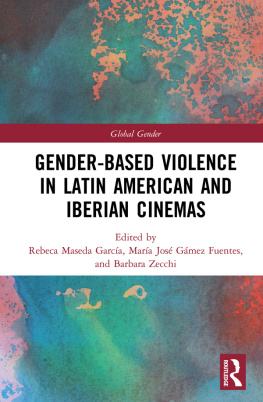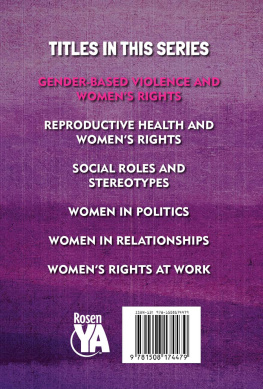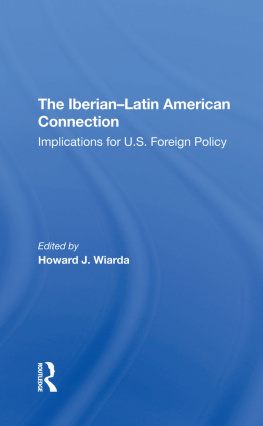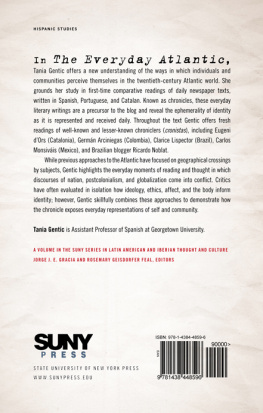Gender-Based Violence in Latin American and Iberian Cinemas
Gender-Based Violence in Latin American and Iberian Cinemas rethinks the intersection between violence and its gendered representation.
This is a groundbreaking contribution to the international debate on the cinematic construction of gender-based violence. With essays from diverse cultural backgrounds and institutions, this collection analyzes a wide range of films across Latin America and the Iberian Peninsula. The volume makes use of varied perspectives including feminist, postcolonial, and queer theory to consider such issues as the visual configuration of power and inequality, the objectification and the invisibilization of womens and LGBTQ subjects resistance, the role of female film-makers in transforming hegemonic accounts of violence, and the subversion of common tropes of gendered violence.
This book will be of significance for students and scholars in Latin American and Iberian studies, as well as in film studies, cultural studies, and gender and queer studies.
Rebeca Maseda Garca is Professor of Spanish at the University of Alaska Anchorage (U.S.A.), where she teaches on gender violence and cinema in Spain, historical memory and the Civil War, and contemporary Latin American and Iberian cinemas; her most recent work focuses on alternative ways of representing female trauma in cinema that respond to an ethical witnessing paradigm. Publications include Gender and Violence in Spanish Culture: From Vulnerability to Accountability (2018), Ensayo sobre la contradiccin: Virginia Woolf en pantalla (2006), Mood, Silence and Ghostly Words: Female Trauma in Isabel Coixets The Secret Life of Words, and Songs of Pain: Female Active Survivors in Claudia Llosas The Milk of Sorrow. She is an associate investigator on a project on the re-signification of women as victims in popular culture.
Mara Jos Gmez Fuentes is Professor of Gender and Media at Universitat Jaume I of Castellon (Spain), and member of the Institute of Feminist Research and the Interuniversity Institute of Social Development and Peace at her home university. She has been a Visiting Fellow at the London School of Economics and Columbia University, among others. Her work focuses on feminist theory, cultural violence, and communication towards social change; her publications include Re-writing Women as Victims: From Theory to Practice (co-edited with S. Nez and E. Gmez, 2019) and Gender and Violence in Spanish Culture: From Vulnerability to Accountability (co-edited with Rebeca Maseda, 2018). Currently she is the principal researcher of research and development projects on the resignification of women as victims and on ethical witnessing.
Barbara Zecchi is a professor and Director of the Interdepartamental Program in Film Studies at the University of Massachusetts Amherst (U.S.A.), and Associate Member of the Academy of Motion Picture Arts and Sciences of Spain. She has published and lectured widely on European and Latin American cinemas, feminist film theory, film adaptation theory, gender studies, aging studies, and video-graphic criticism. In addition to video-graphic essays and journal articles, she is the author or editor of numerous volumes including La pantalla sexuada (2015), Desenfocadas (2014), and Tras las lentes de Isabel Coixet: cine, compromiso y feminismo (2017). Zecchi is vice-director of the international research network CinemAGEnder, and founder of Gynocine a digital humanities project on the production of women filmmakers around the globe.
This timely and well-coordinated collection of essays offers a set of politically urgent and highly original readings of important films from Portugal, Spain and Latin America that make us readers re-think what we thought we knew about gender and violence, or its depiction on the screen.
Santiago Fouz Hernndez, Professor, School of Modern Languages and Cultures, Durham University
This is an important book written and edited by leading experts in their field. The rich edited collection examines film and gender violence within specific systemic cultural contexts privileging female agency and resistance.
Deborah Shaw, Professor of Film and Screen Studies, University of Portsmouth
Global Gender
The Global Gender series provides original research from across the humanities and social sciences, casting light on a range of topics from international authors examining the diverse and shifting issues of gender and sexuality on the world stage. Utilising a range of approaches and interventions, these texts are a lively and accessible resource for both scholars and upper level students from a wide array of fields including Gender and Womens Studies, Sociology, Politics, Communication, Cultural Studies, and Literature.
Gender, Heteronormativity and the American Presidency
Aidan Smith
Cultural Representations of Feminicidio at the US-Mexico Border
Nuala Finnegan
Muslim Womens Rights
Tabassum Fahim Ruby
Gender in the 2016 US Presidential Election
Dustin Harp
Latina Outsiders Remaking Latina Identity
Grisel Y. Acosta
Early Motherhood in Digital Societies
Ideals, Anxieties and Ties of the Perinatal
Ranjana Das
Nordic Gender Equality Policy in a Europeanisation Perspective
Edited by Knut Drum
Gender-Based Violence in Latin American and Iberian Cinemas
Edited by Rebeca Maseda Garca, Mara Jos Gmez Fuentes, and Barbara Zecchi
www.routledge.com/Global-Gender/book-series/RGG
Gender-Based Violence in Latin American and Iberian Cinemas
Edited by Rebeca Maseda Garca, Mara Jos Gmez Fuentes, and Barbara Zecchi
First published 2020
by Routledge
2 Park Square, Milton Park, Abingdon, Oxon OX14 4RN
and by Routledge
52 Vanderbilt Avenue, New York, NY 10017
Routledge is an imprint of the Taylor & Francis Group, an informa business
2020 selection and editorial matter, Rebeca Maseda Garca, Mara Jos Gmez Fuentes,
and Barbara Zecchi; individual chapters, the contributors
The right of Rebeca Maseda Garca, Mara Jos Gmez Fuentes, and Barbara Zecchi to be identified as the authors of the editorial material, and of the authors for their individual chapters, has been asserted in accordance with sections 77 and 78 of the Copyright, Designs and Patents Act 1988.
All rights reserved. No part of this book may be reprinted or reproduced or utilised in any form or by any electronic, mechanical, or other means, now known or hereafter invented, including photocopying and recording, or in any information storage or retrieval system, without permission in writing from the publishers.
Trademark notice: Product or corporate names may be trademarks or registered trademarks, and are used only for identification and explanation without intent to infringe.
British Library Cataloguing-in-Publication Data
A catalogue record for this book is available from the British Library
Library of Congress Cataloging-in-Publication Data








